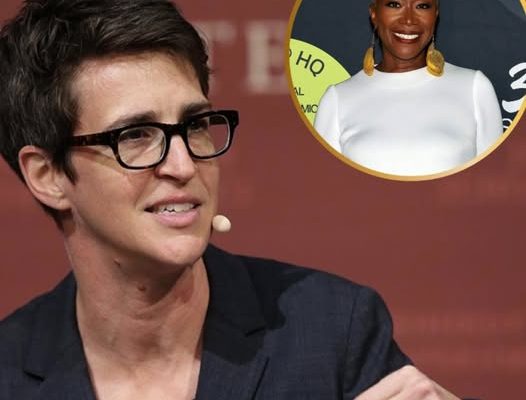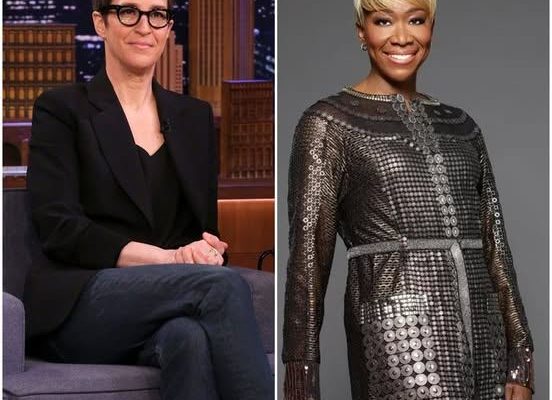
Rachel Maddow Blasts NBC Executives as “Bastards” After Revealing Bombshell Truth Behind Joy Reid’s Termination: Media Industry Stunned by Power Play
In a moment that has sent shockwaves across the media landscape, MSNBC’s most prominent anchor Rachel Maddow has broken her silence and launched a scathing rebuke of NBC executives.
In a fiery and emotionally charged statement during a private media panel leaked to the press, Maddow described the network’s top brass as “bastards” while revealing the controversial and deeply political motivations behind the sudden and surprising termination of fellow MSNBC host Joy Reid.
For years, Joy Reid was a cornerstone of MSNBC’s primetime lineup, known for her sharp political commentary, progressive viewpoints, and passionate delivery on issues of race, justice, and equality.
But when news broke last week that Reid had been let go, the official statement from NBC News framed the decision as a “strategic programming shift” aimed at “diversifying the network’s content offerings.”
However, Maddow is now telling a vastly different story—one that has sparked a firestorm of backlash and renewed public debate over media manipulation, executive power, and racial bias within elite media circles.
Maddow’s Shocking Allegations Against NBC Executives

According to sources close to the situation, Maddow addressed Reid’s departure during an off-camera panel discussion at a closed-door journalism summit in New York City.
The remarks, initially meant to remain confidential, were leaked in full to several media outlets, prompting widespread attention and controversy.
“They pushed her out,” Maddow reportedly said. “Let’s not sugarcoat this—NBC’s top executives are bastards for what they did. Joy Reid was targeted, manipulated, and ultimately discarded because she refused to toe the line.”
Maddow’s words, while raw and unapologetically direct, are being interpreted by media experts and political analysts as a stunning break from the typically unified public image maintained by major networks.
Her comments shed light on an internal power struggle, suggesting that Reid’s termination was not a business decision based on ratings or content direction, but rather a deliberate move to silence a powerful Black female voice who often challenged mainstream narratives.
Inside the Alleged Campaign to Undermine Reid
Several former and current MSNBC employees have since spoken out in support of Maddow’s version of events.
A senior producer, who requested anonymity due to fear of retaliation, said there had been a “long-standing effort” to sideline Reid after her segments began drawing the ire of corporate sponsors and politically connected board members.
“Joy went off-script too many times,” the producer said. “She wasn’t afraid to talk about police brutality, Black voter suppression, or hold powerful Democrats accountable. That made her dangerous in the eyes of some very powerful people.”
Another insider revealed that Reid was frequently left out of internal editorial meetings and faced increased pressure over the past year to “lighten up” her show’s tone, a directive she allegedly resisted.
According to leaked emails, NBC executives had grown increasingly uncomfortable with Reid’s criticisms of establishment figures and her vocal support for progressive candidates during the 2024 election cycle.
These revelations align with what Maddow described as a “coordinated campaign of quiet sabotage,” culminating in what she called “the most disgraceful ousting I’ve ever seen in broadcast news.”
The Fallout Within MSNBC

The aftermath of Maddow’s public denunciation has created a tense and uncertain environment inside MSNBC.
Network insiders report that the newsroom is divided, with some supporting Maddow’s bold stance, while others are distancing themselves from her comments out of concern for job security.
According to a statement released by NBCUniversal, the parent company of MSNBC, “The network values all its employees and does not condone personal attacks.
Our programming decisions are made based on a range of factors, including audience data, market trends, and strategic vision.”
The statement did not directly address Maddow’s accusations, nor did it clarify the specific reasons behind Reid’s dismissal.
This has only fueled speculation that NBC is trying to contain a rapidly growing public relations crisis.
Maddow, who signed a multi-million dollar contract extension in 2022 that allowed her more flexibility and influence over her content, is said to be “disgusted” and “contemplating her own future with the network,” according to an MSNBC staffer familiar with the situation.
Public Reaction and Support for Joy Reid
As the story has unfolded, social media has exploded with messages of support for Joy Reid. Hashtags like #JusticeForJoy, #ReinstateJoyReid, and #MSNBCCoverUp have trended nationwide, with millions of users—including high-profile celebrities, politicians, and civil rights activists—demanding transparency and accountability from NBC.
Prominent figures such as Ava DuVernay, Senator Elizabeth Warren, and author Ta-Nehisi Coates have spoken out, calling Reid’s removal “deeply concerning” and indicative of “an institutional problem with race and representation in media.”
Even rival networks have covered the fallout, with CNN’s Abby Phillip devoting a segment to the issue, stating, “If Maddow’s claims are true, it raises disturbing questions about who really controls the narrative in American newsrooms.”
A Change.org petition calling for Reid’s reinstatement has already garnered over 800,000 signatures in under a week, reflecting the growing public outrage and desire for answers.
Race, Power, and the Media: The Broader Implications
Beyond the immediate drama, Maddow’s revelations have reignited a broader conversation about the structure of American media and the systemic inequalities that often go unaddressed.
Joy Reid was one of the few Black women hosting a primetime news show on a major cable network.
Her presence mattered—not just symbolically, but substantively. She regularly amplified underrepresented voices and brought attention to stories often ignored by traditional media.
Her termination, as described by Maddow, highlights the fragile nature of progress in the media industry, where diversity can be celebrated one day and eliminated the next.
“This isn’t just about Joy Reid,” said Dr. Jelani Cobb, dean of Columbia Journalism School. “This is about who gets to speak truth to power.
This is about editorial independence. And most importantly, this is about whether media companies are truly committed to inclusion, or only when it’s convenient.”
NBC’s History with Diversity Under Scrutiny
This isn’t the first time NBC has faced criticism over its treatment of minority talent. In recent years, the network has parted ways with several prominent voices of color under controversial circumstances, including journalist Tamron Hall, anchor Craig Melvin (who later returned in a reduced role), and several Latino contributors who publicly decried feeling marginalized.
In 2020, a coalition of NBCUniversal employees issued a letter accusing the company of performative allyship in the wake of George Floyd’s murder, alleging that internal hiring practices still heavily favored white candidates for leadership roles.
“Until people like Joy Reid are treated with the same respect, protection, and autonomy as their white counterparts, nothing changes,” one former NBC diversity consultant wrote in a viral LinkedIn post reacting to the Maddow controversy.
Maddow’s Legacy—and What Comes Next
Rachel Maddow’s reputation as one of the most influential figures in modern journalism makes her comments impossible to ignore.
Over the years, she has cultivated a loyal audience, earned critical acclaim, and set a high standard for investigative reporting.
Her decision to publicly challenge the network that made her a household name is seen by many as a courageous act of conscience.
Still, questions remain about what Maddow will do next. Some insiders believe she is preparing to break ties with NBC altogether and launch an independent media platform similar to those pursued by other high-profile journalists such as Glenn Greenwald and Megyn Kelly.
Others suggest she may be using her influence to force NBC into a reckoning with its internal culture, hoping to leverage her position to bring Joy Reid back or at least spark a serious review of executive decision-making.
For now, Maddow has remained silent publicly since the initial leaked comments, possibly on legal advice.
But her words continue to reverberate across the media industry.

The Future of Joy Reid
As for Joy Reid, sources say she is “weighing her options” and has received multiple offers from streaming platforms, podcasting networks, and independent news outlets.
Several have publicly expressed interest in working with her, including The Atlantic, Pod Save America, and Black News Channel.
“Joy Reid is not going anywhere,” one longtime friend and colleague said. “She has a powerful voice, and whether it’s on cable news or her own terms, she’ll be heard again soon.”
Still, the pain of the departure is fresh for many of her viewers, who had grown accustomed to her bold takes, honest reporting, and community-focused commentary.
The Maddow leak has only deepened their frustration and clarified what many suspected—that Reid’s exit was less about ratings and more about resistance.
Conclusion: A Moment of Reckoning
Rachel Maddow’s blistering takedown of NBC executives over Joy Reid’s firing may go down as one of the most consequential acts of whistleblowing in modern television history.
Her decision to expose what she called “a shameful manipulation of power” has not only thrown NBC into turmoil but also ignited a broader movement demanding reform, transparency, and genuine representation in media.
At a time when trust in journalism is fragile, and the lines between news, corporate interest, and politics are increasingly blurred, Maddow’s voice—once the network’s crown jewel—has become its most powerful internal critic.
And her target is not a rival party or public official, but the very institution she helped build.
The story is far from over. But one thing is clear: the public is watching, and this time, they’re not looking away




